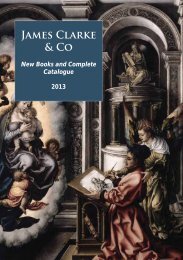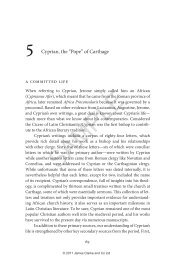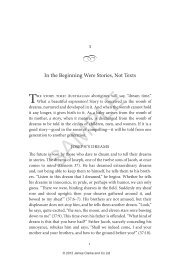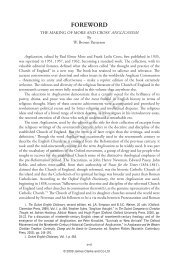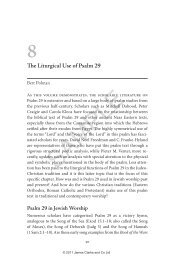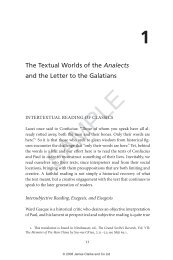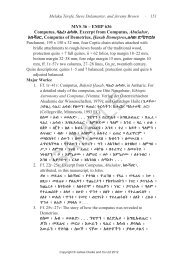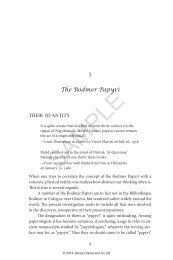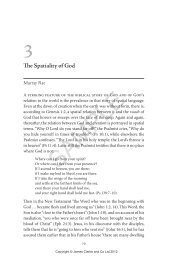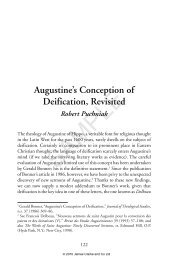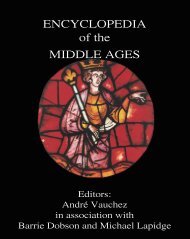Introduction by Kirk R. MacGregor - James Clarke and Co Ltd
Introduction by Kirk R. MacGregor - James Clarke and Co Ltd
Introduction by Kirk R. MacGregor - James Clarke and Co Ltd
You also want an ePaper? Increase the reach of your titles
YUMPU automatically turns print PDFs into web optimized ePapers that Google loves.
<strong>Introduction</strong><br />
ing that not all who are descended from Israel are members of Israel, for<br />
whom God’s priority in the gospel <strong>and</strong> promises in election still st<strong>and</strong>,<br />
<strong>and</strong> that the true Israel is revealed through the new way of the Spirit, the<br />
ultimate reality to which the Torah pointed. Voorwinde closes <strong>by</strong> illustrating<br />
how 8:35–39 utilize the twin foci of the death of Christ <strong>and</strong> the gift of<br />
the Spirit to draw together the threads of divine love in Romans, as God<br />
could never abdicate or refuse love to those in whom he has made such<br />
infinite investments.<br />
In chapter six, writing from a Calvinist st<strong>and</strong>point, Verlyn D.<br />
Verbrugge assesses the impact of 2 Peter 1:8–11 on the doctrine of election<br />
through analysis of the passage’s socio-historical background, grammar,<br />
<strong>and</strong> structure. Regarding background, Verbrugge shows that Peter is<br />
addressing two distinct groups—believers <strong>and</strong> false teachers—the latter<br />
of which were once affiliated with the church but have now capitulated<br />
to worldly corruption. This breakdown is significant because it shows<br />
that Peter did not have a third “transitional” group in mind composed<br />
of persons gradually sliding out of the group of believers <strong>and</strong> into allegiance<br />
with the false teachers; for Peter, anyone who joined the false<br />
teachers there<strong>by</strong> proved themselves to have never received the grace of<br />
God. Verbrugge cites approvingly the counterfactual insight of 1 John<br />
2:19, which indicates that the false teachers never actually belonged to<br />
the church since, if they had, they would not have ab<strong>and</strong>oned it. Placing<br />
2 Peter 1:8–11 in its context, Verbrugge reveals that the preceding verses<br />
1–7 display concern that believers escape sin <strong>and</strong> increasingly cultivate<br />
Christian virtues on the basis of the fact that they have received God’s allempowering<br />
gifts of faith, salvation, <strong>and</strong> the indwelling divine nature. This<br />
fact is corroborated <strong>by</strong> the use of ejpivgnwsi~ in verse 8, indicating that<br />
those charged to display the eightfold virtues of verses 5–7 possess the<br />
decisive saving knowledge of God rooted in personal conversion, which<br />
is precisely the knowledge that Peter later claims the false teachers have<br />
ignored. In verse 9’s description of the false teachers, Verbrugge maintains<br />
that the adverb pavlai (“long ago, in the past”) should not be linked with<br />
aJmartiw`n (“sins”), as though the false teachers were previously cleansed of<br />
their sins, but is a temporal indicator of when the false teachers heard, <strong>and</strong><br />
unfortunately ignored, the message of how to receive forgiveness. Upon<br />
examination of the major Greek terms in verse 10, Verbrugge concludes<br />
that “making sure” (poiei`sqai . . . bevbaio~) of one’s elective call means<br />
neither to cause nor to fortify one’s eternal salvation, but rather to confirm<br />
SAMPLE<br />
xxv<br />
© 2011 <strong>James</strong> <strong>Clarke</strong> <strong>and</strong> <strong>Co</strong> <strong>Ltd</strong>



